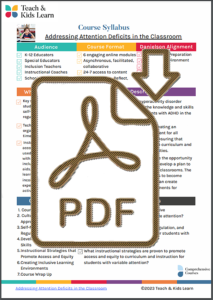Complex Textual Reading, Grades 6-12
Course Description
 |
This course on complex textual reading will provide educators with the knowledge and skills necessary to help students comprehend challenging text.
The course will cover key strategies for teaching close reading, including how to help students carefully analyze and interpret texts. Educators will learn about the factors that contribute to text complexity and how to determine the complexity level of texts for students. |
In addition, the course will examine the role of the teacher in teaching students to use text evidence to support their analysis and interpretation of texts, including the importance of promoting higher-order thinking through questioning.
Throughout the course, educators reflect on their teaching practices and develop a plan for incorporating complex textual reading in their classrooms. The goal of the course is to empower educators to become confident and competent teachers who prepare students to access complex texts across disciplines.
Essential Questions
- What is the relationship between text complexity, close reading, and comprehension?
- What are evidence-based strategies for comprehending complex text?
- What role does metacognition play in reading comprehension?
Course Agenda
|
| Course Syllabus |
|
Comments from Teachers
“This course taught me how to complete a proper close reading with different questions and viewpoints to be evaluated with each reading.”
“I will use the RACE, RAFT, and other protocols learned in the modules to help improve my teaching pedagogy in the classroom.”
Danielson Teacher Framework Course Alignment


